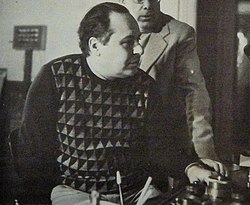Top Qs
Timeline
Chat
Perspective
Bruno Nicolai
Musical artist From Wikipedia, the free encyclopedia
Remove ads
Bruno Nicolai (20 May 1926 – 16 August 1991) was an Italian film music composer, orchestra director, conductor, pianist and musical editor, most active in the 1960s through the 1980s.[1]
This article needs additional citations for verification. (November 2015) |
While studying piano and composition at the Santa Cecilia Conservatory in Rome, he befriended Ennio Morricone and formed a long working relationship, with Nicolai eventually conducting for and co-scoring films with Morricone. Morricone noted in an interview discussing the Dollars Trilogy, "I chose a great musician and friend to be my conductor: Bruno Nicolai, who conducted almost every score of mine from that point on until 1974."[2] Nicolai also scored a number of giallo exploitation films and wrote many scores for director Jesús Franco.
Remove ads
Collaboration with Ennio Morricone
Nicolai frequently collaborated with Morricone, conducting many of his scores, including those for Sergio Leone's "For a Few Dollars More" (1965) and "The Good, the Bad and the Ugly" (1966). Morricone praised Nicolai as a great musician and friend who conducted nearly all his scores until 1974. Their partnership eventually ended due to disagreements over credit attribution. His work was featured in the Quentin Tarantino films Kill Bill: Volume 2[1] and Once Upon a Time in Hollywood.
Remove ads
Independent career
Beyond his work with Morricone, Nicolai established himself as a distinguished composer, scoring over 100 films and numerous television productions. He was particularly noted for his contributions to the giallo and exploitation genres, collaborating with directors like Jesús Franco, Tinto Brass, and Alberto De Martino. Notable scores include "The Red Queen Kills Seven Times" (1972) and "The Case of the Bloody Iris" (1972).
Remove ads
Musical style and legacy
Nicolai's compositions are characterized by their rich orchestration and innovative use of instruments, including bells, anvils, and whips, elements that became synonymous with the spaghetti western sound. He also explored various musical styles, from classical to avant-garde, and was known for his work in library music, founding the labels Gemelli and Edi-Pan.
His music has experienced a resurgence in popularity, featuring in modern films such as Quentin Tarantino's "Kill Bill: Volume 2" (2004) and "Once Upon a Time in Hollywood" (2019).
Later years and death
Nicolai continued to compose and conduct until his final years, with his last known score being for the 1988 TV series "La coscienza di Zeno." He died on August 16, 1991, in Rome. Despite being overshadowed during his lifetime, Nicolai's work has gained recognition posthumously, cementing his status as a significant figure in Italian film music.
Selected filmography
Remove ads
References
External links
Wikiwand - on
Seamless Wikipedia browsing. On steroids.
Remove ads

